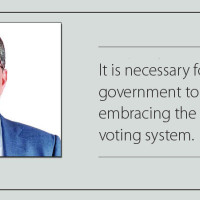- Wednesday, 11 February 2026
Tax The Rich People
The current tax regime in Nepal places an undue burden on workers while allowing the ultra-wealthy to evade their fair share. Trade union leaders, particularly those representing workers providing essential public services, such as healthcare, sanitation, and local government functions, are urging the government to move towards a more equitable national tax system and advocate for the same at the global level.
In its existing structure, the tax regime negatively affects both workers and public services. Nepal urgently requires reforms to foster tax justice and a more balanced distribution of wealth. Stronger measures are needed to curb corporate tax avoidance, alongside the introduction of a wealth tax targeting the rich and the wealthy individuals. At the global stage, Nepal should join efforts by countries like Brazil to advocate for taxing the world’s billionaires.
Nepal has made notable progress in increasing corporate tax contributions. Corporate tax revenue as a percentage of the Gross Domestic Product (GDP) has risen from 0.17% per cent in 1990 to 3.15 per cent in 2020. While this is an encouraging trend, trade unions are arguing that it is still an extremely low contribution and must increase to fund the public services the country needs to prosper and to pay workers who deliver services properly. Profit shifting to tax havens or countries with low corporate tax rates has cost Nepal at least 2 million USD.
The corporate tax rates in Nepal are quite acceptable – ranging from 25 per cent for general companies to 30 per cent for sectors like petroleum and banking. Yet tax evasion and avoidance by the companies remain significant challenges. The government needs to strengthen enforcement mechanisms and revisit tax laws to close loopholes that allow corporations to avoid paying their fair share.
There is also the growing issue of offshore wealth held by the wealthy Nepalis. The rich Nepalis have parked significant amounts of wealth in other countries. An estimated 600 million USD is parked abroad, resulting in an annual tax revenue loss of 8.4 million USD. This is close to 2 per cent of Nepal’s GDP. The existence of substantial offshore wealth suggests that wealthy individuals are avoiding taxes by keeping their assets in jurisdictions with lower or no taxes. This wealth concentration exacerbates social inequality and undermines government efforts to fund essential public services.
The government should also draw its attention to the global momentum for tax reform. Brazil recently proposed for a 2 per cent wealth tax on billionaires as part of the G20 agenda. With the UN Framework Convention on International Tax Cooperation being drafted, Nepal has a historic opportunity to take a leadership role in advocating for fair taxation on multinational enterprises and high-net-worth individuals. As a progressive, pro-worker country, Nepal should vocally support the call for wealth taxes on the obscenely rich.
Tax reforms can be a game changer for the workers of the country. The increased revenue could be (and should be) spent on strengthening of public services, their infrastructure and workers’ welfare. For example, the government can meet the demand for better working conditions and decent wages for Community Health Workers (CHWs). This all-women workforce serves as frontline health providers, visiting communities door-to-door to deliver essential services and health education.
CHWs play a vital role in connecting people with healthcare facilities. But they don’t receive even the minimum wage or social security. It’s not fair that billionaires can hide their wealth offshore while the CHWs are denied simple wages and security. Increased tax revenue would allow the government to support them and other such workers properly.
Workers face double burden from an unfair tax system. Their working conditions suffer from underinvestment and are also taxed heavily on their income and the goods they buy. If the wealthy were made to pay their share, it would relieve some of this burden.As trade unionists, we urge the government to take bold steps in tax reform, ensuring that both corporations and wealthy individuals contribute fairly to the country’s growth and the well-being of its workers.
















